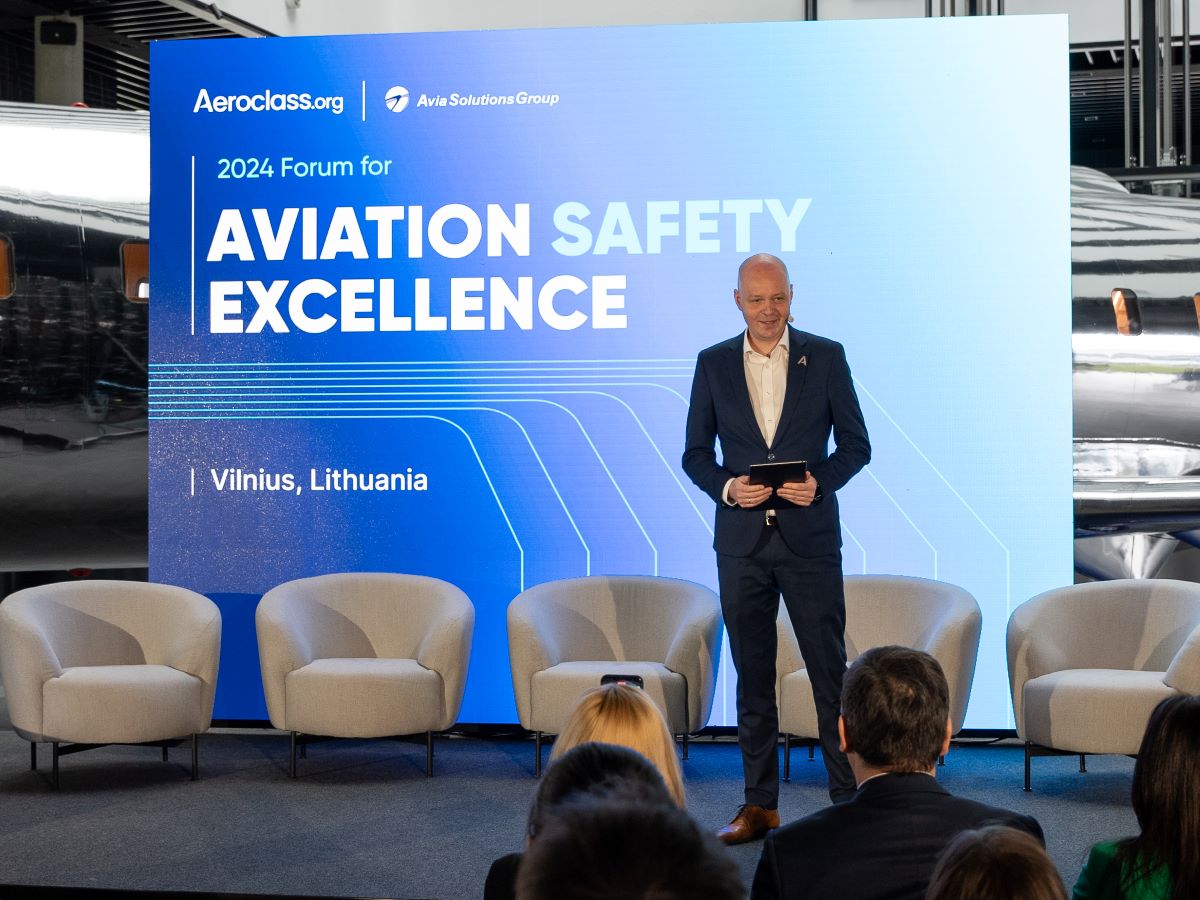 While knowing the aviation safety rules and protocols is a must, knowledge alone is not enough to ensure safety in aviation. According to the experts gathered at the Forum for Aviation Safety Excellence in Vilnius, the ability to anticipate, identify, and manage all potential risks and threats is as important. The Forum was organised by the digital aviation training platform Aeroclass, with support by its parent company Avia Solutions Group.
While knowing the aviation safety rules and protocols is a must, knowledge alone is not enough to ensure safety in aviation. According to the experts gathered at the Forum for Aviation Safety Excellence in Vilnius, the ability to anticipate, identify, and manage all potential risks and threats is as important. The Forum was organised by the digital aviation training platform Aeroclass, with support by its parent company Avia Solutions Group.
Held at the Aero City venue in Vilnius, the exclusive, invitation-only Forum brought together aviation safety experts and specialists from all across Europe. In addition to panels and keynote speeches, the event featured an extensive networking session, where representatives of different airlines, aviation companies and regulatory institutions could discuss major challenges and opportunities.
“From its inception, we saw the Forum as a place where expertise meets experience. I’m proud to say it has exceeded our highest expectations, and we hope that it becomes an annual tradition. Enhancing safety standards industry-wide requires breaking down silos among experts from various sectors. I am glad that this Forum provided the much-needed platform for dialogue and cooperation. Sharing knowledge, experience, and lessons learned is the bedrock of safety in aviation, especially in the digital-information age,” said Julius Norkunas, CEO of Aeroclass, a co-organiser of the event.
Aviation is a highly regulated industry that pays close attention not only to procedures, but also to theoretical and practical training, which encompasses activities to be taken during unforeseen circumstances. According to the International Air Transport Association (IATA), last year was the safest one so far, with not a single death recorded due to a crashed jet aircraft. Ugne Maciejauskaite, Head of Safety at Avia Solutions Group, said that the continuously improving safety metrics are the result of cooperation between market participants and their open dialogue when it comes to tackling daily challenges.
"The main message of the conference is a reminder that, since it’s simply not possible to anticipate and describe all possible extreme scenarios, aviation specialists must be flexible and capable of reacting quickly under all circumstances. Potential sources of risk are proliferating year to year – from amateur drones being used too close to airports to spontaneously combusting smart devices, which makes it crucial to always stay one step ahead and to keep one’s bearings even when the situation is not a textbook one,” said Ugne Maciejauskaite.
Aviation safety map
Among the speakers of the Forum were John Franklin, Head of Safety Promotion at the European Aviation Safety Agency (EASA), representatives of different airlines, as well as Vidmantas Pleta, Director of the Department of Civil Aviation at the Lithuanian Transport Competence Agency, Henrikas Armoska-Eismontas, Head of Emergency Planning at Lithuanian Airports.
According to John Franklin, the aviation community features several key elements that help ensure safety:
“One of our main priorities is the mindset of those working in the industry, which must be grounded in efforts to continuously promote safety and trust. Other important factors include qualified and well-trained specialists capable of ensuring aviation safety, as well as the infrastructure it requires.”
According to the representative of EASA, such events dedicated to aviation safety help to reduce the gap between theory and daily practice.
Founded in 2002, EASA is responsible for the aviation safety and environmental protection standards of the European Union as a whole. EASA inspects and certifies not just aircraft in general, but even such tiny details as the bolts used in them. During recent years, the organisation’s remit has expanded further, today encompassing such areas as cybersecurity and the safe operation of drones.
Special attention to the NATO Summit in Vilnius
Henrikas Armoska-Eismontas, Head of Emergency Planning at Lithuanian Airports, paid much attention to NATO Summit 2023 – one of that year’s major events.
“The NATO Summit in Vilnius was an exceptional event, reminding us of the continuous need to anticipate and deal with different emergency scenarios. No matter whether the risk comes in the form of aircraft accidents, ground incidents, sabotage, threats, dangerous cargo, fires, or natural disasters, we remain steadfast in our commitment to ensure the safety of our passengers and staff”.
Intensive preparations for the NATO Summit took almost half a year, with almost 700 people working at the airport during the event itself to ensure security and seamless logistics. In addition, a centralised Control Centre, which united representatives of all the agencies and private companies taking part in the process, was set up to facilitate things on the days of the Summit. When speaking of the event, Mr. Armoska-Eismontas emphasised that everything had to be timed by the minute, if not by the second:
“Unlike in the case of regular flights, aircraft carrying heads of states announced their exact times of arrival only shortly before landing. For every aircraft to land safely, all the specialists involved in the process – from air navigation and ground handling experts to motorcade drivers and on-duty firefighters – had to work with extreme precision and coordinate their every move”.
The airports of Vilnius and Kaunas also faced some additional challenges due to unusually large aircraft, the wingspan of which reaches as many as 80 meters. Among them was the Air Force One, which flew in the US President. To enable such a large aircraft to safely turn around in the apron, Vilnius Airport even had to physically remove one of its light poles.
Having succeeded in bringing together representatives of both the public and private sector, Aeroclass plans to host more events of a similar nature in the future.





